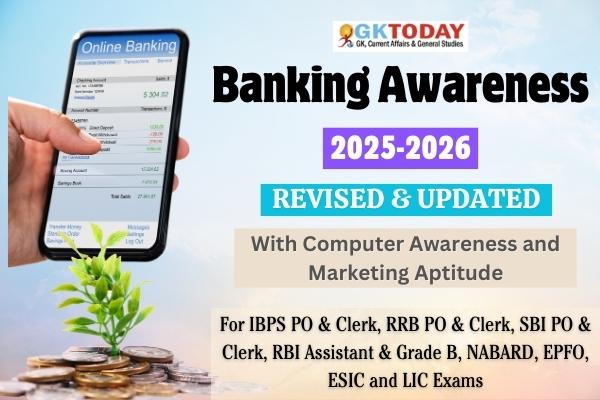Banking & General Financial Awareness
Banking & General Financial Awareness Multiple Choice Questions (MCQs) and Answers with explanation for All Banking Exams of 2024-25 such as IBPS Bank PO, IBPS Bank Clerical, RRB PO and Clerical, SBI PO and SBI Clerical, IBPS Recruitments, RBI Grade B and RBI Banking Examinations.
31. Which annual survey tracks the financial literacy levels in India?
[A] NCFE Financial Inclusion Survey
[B] Financial Literacy and Inclusion Survey
[C] SEBI Investor Survey
[D] RBI Banking Awareness Report
Show Answer
Correct Answer: B [Financial Literacy and Inclusion Survey]
Notes:
The Financial Literacy and Inclusion Survey is conducted to assess the financial literacy levels of individuals in India, helping regulators shape financial education initiatives.
32. What is a key objective of ESG compliance in the banking sector?
[A] To increase short-term profitability
[B] To meet global sustainability standards and reduce risks
[C] To promote speculative trading
[D] To fund only high-risk ventures
Show Answer
Correct Answer: B [To meet global sustainability standards and reduce risks]
Notes:
ESG compliance in banking aims to meet global sustainability standards, manage environmental and social risks, and ensure long-term value creation.
33. What is the primary role of the Financial Stability Board (FSB)?
[A] To provide loans to developing countries
[B] To regulate international trade
[C] To promote international financial stability
[D] To manage foreign exchange reserves
Show Answer
Correct Answer: C [To promote international financial stability]
Notes:
The Financial Stability Board (FSB) promotes international financial stability by coordinating national financial authorities and international standard-setting bodies.
34. Offshore banks primarily deal with:
[A] Local depositors
[B] Domestic retail customers
[C] International clients
[D] Cooperative societies
Show Answer
Correct Answer: C [International clients]
Notes:
Offshore banks primarily serve international clients, including individuals and corporations seeking financial services outside their home countries.
35. Which of the following is a major risk associated with offshore banking?
[A] Lower interest rates on deposits
[B] High operational costs
[C] Regulatory arbitrage and reputation risk
[D] Limited currency exchange services
Show Answer
Correct Answer: C [Regulatory arbitrage and reputation risk]
Notes:
Offshore banking poses risks such as regulatory arbitrage, where banks exploit differences in regulations, and reputation risk due to perceived association with illegal activities.
36. Which global initiative ensures financial transparency and combats the misuse of offshore banking?
[A] Basel IV
[B] OECD’s Global Forum on Transparency and Exchange of Information
[C] FATF Blacklist
[D] WTO Banking Agreement
Show Answer
Correct Answer: B [OECD’s Global Forum on Transparency and Exchange of Information]
Notes:
The OECD’s Global Forum on Transparency and Exchange of Information promotes financial transparency and combats the misuse of offshore banking for tax evasion and other illicit purposes.
37. Which cybersecurity threat involves attackers encrypting a bank’s data and demanding payment for its release?
[A] Phishing
[B] Ransomware
[C] DDoS attack
[D] Man-in-the-middle attack
Show Answer
Correct Answer: B [Ransomware]
Notes:
Ransomware is a type of cyberattack where attackers encrypt sensitive data and demand a ransom in exchange for the decryption key. It is a threat to financial institutions.
38. Which technology is being integrated with blockchain to enhance data security and transparency in banking operations?
[A] Quantum Computing
[B] Internet of Things (IoT)
[C] Artificial Intelligence (AI)
[D] Virtual Reality (VR)
Show Answer
Correct Answer: C [Artificial Intelligence (AI)]
Notes:
The integration of Artificial Intelligence (AI) with blockchain technology is being explored to bolster data security and transparency in banking operations. This convergence aims to create more robust systems capable of detecting and mitigating cyber threats in real-time.
39. A bond trading at a discount means:
[A] Its market price is higher than its face value
[B] Its market price is lower than its face value
[C] It pays a higher coupon rate
[D] It has no maturity period
Show Answer
Correct Answer: B [Its market price is lower than its face value]
Notes:
A bond trading at a discount means its market price is lower than its face value. This typically happens when interest rates in the market rise.
40. Which of the following is a type of underwriting?
[A] Pure underwriting
[B] Combined underwriting
[C] Syndicate underwriting
[D] All of the above
Show Answer
Correct Answer: D [All of the above]
Notes:
The different types of underwriting include pure underwriting, combined underwriting, and syndicate underwriting, depending on the nature of the agreement and participants involved.

